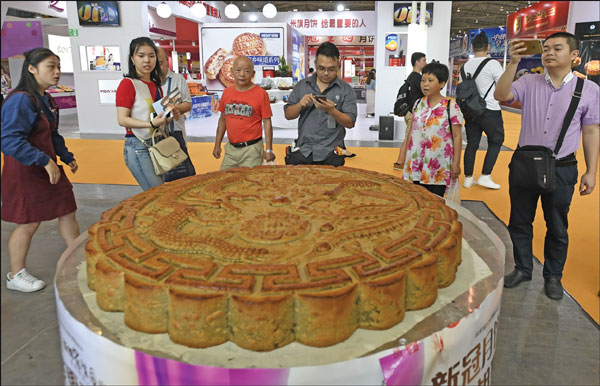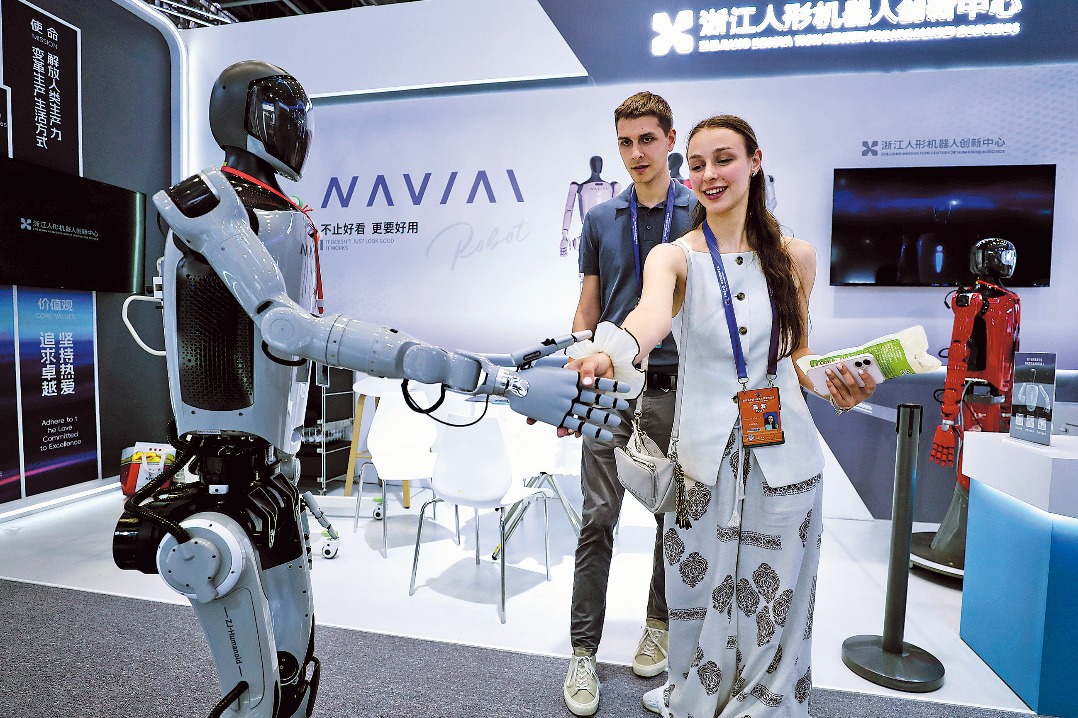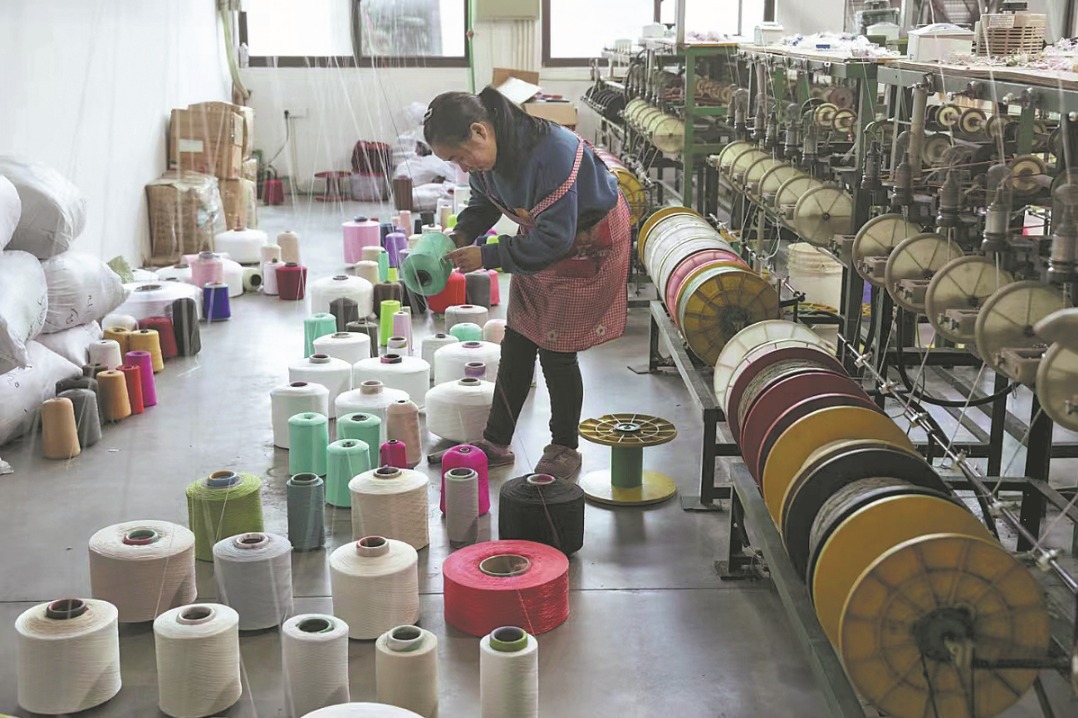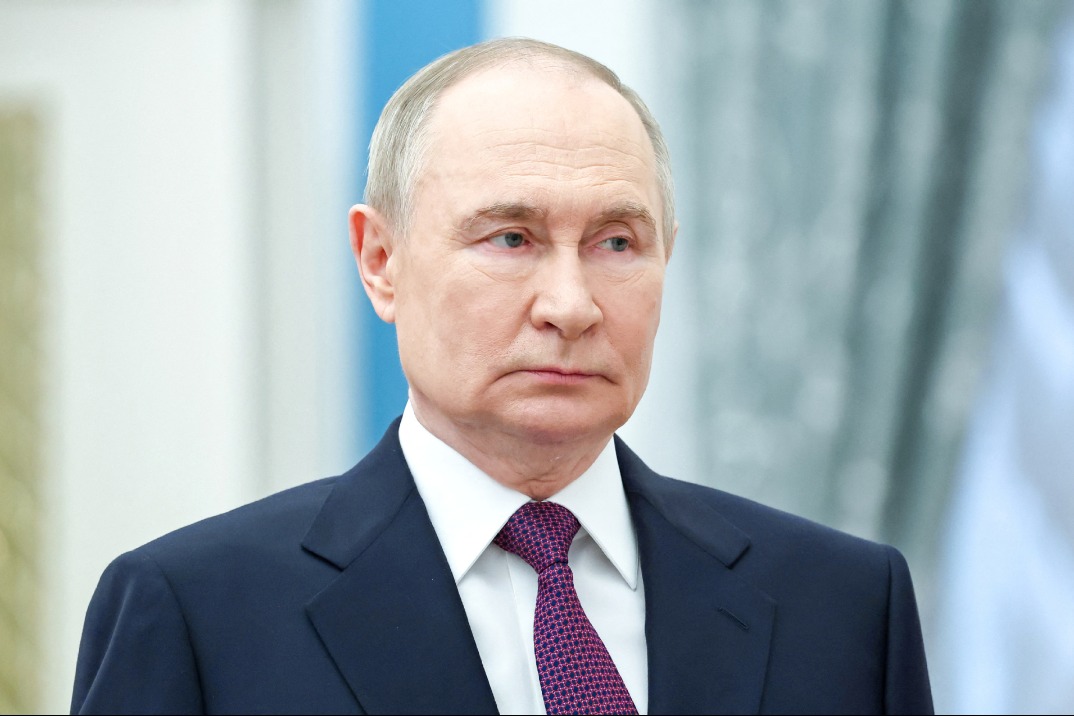IN BRIEF (Page 24)

| A 300-kilogram mooncake is displayed at the China (Sichuan) Mid-Autumn Festival Food Fair in Chengdu, Sichuan province. The fair began on Sept 19. Provided to China Daily |
Airbus opens new center in Tianjin
Aircraft manufacturer Airbus Group SE inaugurated its first overseas wide-body completion and delivery center in Tianjin on Sept 20, and delivered its first Euro-Chinese-made wide-body A330 aircraft to Tianjin Airlines from the new plant. This aircraft was completed by Chinese workers earlier in Toulouse, France, with support from their European peers. Some 150 Chinese staff were trained by Airbus experts for six to nine months and they will later work at the Tianjin center, which will not only deliver aircraft to China but also to the whole Asian market. The Tianjin center will cover various aircraft finishing work, including cabin installation, painting, flight tests, customer endorsements and delivery. It will employ more than 250 people and will be ready to deliver two aircraft per month by early 2019. Airbus (Tianjin) Final Assembly Co is owned 51 percent by Airbus and 49 percent by the Tianjin Free Trade Zone Investment Co and Aviation Industry Corporation of China.
Central bank injects fresh funds to market
China's central bank on Sept 14 injected fresh funds to the money market via reverse repos to keep liquidity stable. The People's Bank of China pumped 100 billion yuan ($15.3 billion) into the financial system via a process by which the central bank purchases securities from commercial banks through bidding with an agreement to sell them back in the future. The operations included 60 billion yuan seven-day reverse repos priced to yield 2.45 percent, 30 billion yuan of 14-day contracts with a yield of 2.6 percent and 10 billion yuan of 28-day agreements with a yield of 2.75 percent. The central bank has increasingly relied on open market operations for liquidity management, rather than cuts in interest rates or reserve requirement ratios. China set the tone of its monetary policy in 2017 as prudent and neutral, keeping appropriate liquidity levels but avoiding excessive liquidity injections.
German auto parts supplier opens plant
Work began on a new factory for sunroof maker Webasto Group on Sept 19 in Hubei province. The factory, the German company's largest in China, is expected to produce 2 million sunroofs for cars by 2021, the company said. The project will cover 67,000 square meters in Caidian district in Wuhan. The new production line will cost around 300 million yuan ($45.8 million; 38.5 million euros; £33.92 million). According to Freddy Geeraerds, CEO of Webasto China, the market for panoramic roofs in China is expanding rapidly.
Growth of tourism to Israel continues
China was again Israel's fastest-growing source of tourists in the first seven months of this year, according to Israel's top tourism official. More than 64,000 Chinese tourists visited Israel from January to July, up 66 percent year-on-year, outpacing the global average of 17 percent, Yariv Levin, Israel's minister of tourism, said during his first official visit to China. Levin attributed the rapid growth of Chinese tourists to more convenient transportation. There are now direct flights to Israel's commercial hub Tel Aviv from Beijing, Shanghai and Hong Kong.
Talent training program launched
The National Development and Reform Commission held a ceremony on Sept 19 launching the Belt and Road Talent Training Program. The program, which offers both short-term training and a two-year master's degree program, will receive applications from officials and college students in economies involved the initiative. The program is sponsored by the Tanoto Foundation.
New Ikea store coming to Jiangsu
A new outlet for furniture retailer Ikea will be built in Xuzhou, Jiangsu province. Workers have broken ground for the store in the Xuzhou Economic and Technological Development Zone. The store, expected to open next summer to serve about 120 million people in the Huaihai Economic Zone. Ikea is the world's biggest furniture retailer. It currently has 24 stores and two pickup and order points in China.
Outsourcing of services growing
China's service outsourcing industry's combined contracts grew by an average of 54 percent each year from 2006 to 2016. Businesses agreed to service outsourcing contracts worth $1.38 billion (1,161 euros; £1,023) in 2006 and $106 billion in 2016, says Xian Guoyi, head of the Ministry of Commerce service trade department. China's share of the global market rose from less than 1 percent to 33 percent during the period and now ranks second, says Xian, adding the next decade will continue to see huge growth. Service outsourcing created 1.21 million new jobs last year, with a total of 8.6 million people employed.
Govt encourages SOE innovation
China's State assets regulator and the Ministry of Science and Technology signed a cooperation agreement on Sept 20 to encourage innovation in centrally administered State-owned enterprises. The SOEs invested more than 380 billion yuan ($58.1 billion; 48.84 billion euros; £43.05 billion) in research and development in 2016, and have seen average annual growth of over 20 percent in the past few years. These enterprises own 80 national key laboratories which account for nearly half of the total. "The SOEs are playing an increasingly important role in technological innovation," says Xiao Yaqing, chairman of the State-owned Assets Supervision and Administration Commission. Minister of Science and Technology Wan Gang says supportive policies will be rolled out to encourage SOEs to innovate more.
Eni inks oil cooperation deal with CNPC
Italian oil giant Eni signed a cooperation agreement with China National Petroleum Corp on Sept 20 in a move that could give it access to the Chinese market. Eni said in a statement it had agreed to work with State-owned CNPC in the fields of exploration and production, liquefied natural gas, trade and petrochemicals. The deal will cover operations in China and abroad. "It could allow Eni to tap Chinese resources while allowing CNPC to use Eni's skills to develop its assets round the world," one London-based oil analyst says.
Egyptian, Chinese banks sign deals
China Development Bank, the largest Chinese bank for cooperative foreign investment and financing, signed two deals on Sept 17 to provide loans to Egypt's two major financial institutions SAIBANK and Banque Misr. The deals were signed at a ceremony at the Banque Misr headquarters in Cairo, which was attended by Chinese Ambassador to Egypt Song Aiguo and representatives from the Central Bank of Egypt. The first deal included two loan agreements under which the CDB will provide SAIBANK with a loan of $40 million for small and medium-sized enterprises, and a special RMB-denominated loan of 260 million yuan ($40 million; 33.66 million euros; £29.64 million) for infrastructure construction. The second deal was a memorandum of understanding signed by CDB and Banque Misr under which the CDB will provide the Egyptian bank with a loan in Chinese currency for the first time.
New Zealand meat arrives in China
The first shipment of frozen meat imported from New Zealand has arrived in Zhengzhou, Henan province. The shipment, 13 metric tons of nine different types of meat, departed from Tauranga Port on Aug 8. Zhengzhou is home to China's first inland port for imported meat. The port follows a seven-day-24-hour working system, which slashes inspection time to seven to 10 days from 30 days in coastal ports. The Chinese government reached an agreement with New Zealand in March on importing frozen meat. The shipment was the first imported by an inland port.
(China Daily Africa Weekly 09/22/2017 page24)
Today's Top News
- Ukraine crisis a lesson for the West
- Autonomous networks driving the progress of telecom sector
- China launches cargo drone able to haul up to 1.2 tons
- Key role of Sino-German ties stressed
- Tariffs hurt global trade: Experts
- Rescuers race against time to find survivors































